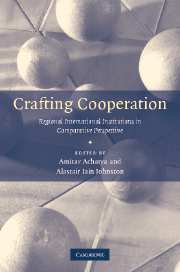Book contents
- Frontmatter
- Contents
- List of tables
- Notes on the contributors
- Acknowledgments
- 1 Comparing regional institutions: an introduction
- 2 Hanging together, institutional design, and cooperation in Southeast Asia: AFTA and the ARF
- 3 International cooperation in Latin America: the design of regional institutions by slow accretion
- 4 Crafting regional cooperation in Africa
- 5 Functional form, identity-driven cooperation: institutional designs and effects in post-Cold War NATO
- 6 Designed to fail or failure of design? The origins and legacy of the Arab League
- 7 Social mechanisms and regional cooperation: are Europe and the EU really all that different?
- 8 Conclusion: institutional features, cooperation effects, and the agenda for further research on comparative regionalism
- Bibliography
- Index
6 - Designed to fail or failure of design? The origins and legacy of the Arab League
Published online by Cambridge University Press: 22 September 2009
- Frontmatter
- Contents
- List of tables
- Notes on the contributors
- Acknowledgments
- 1 Comparing regional institutions: an introduction
- 2 Hanging together, institutional design, and cooperation in Southeast Asia: AFTA and the ARF
- 3 International cooperation in Latin America: the design of regional institutions by slow accretion
- 4 Crafting regional cooperation in Africa
- 5 Functional form, identity-driven cooperation: institutional designs and effects in post-Cold War NATO
- 6 Designed to fail or failure of design? The origins and legacy of the Arab League
- 7 Social mechanisms and regional cooperation: are Europe and the EU really all that different?
- 8 Conclusion: institutional features, cooperation effects, and the agenda for further research on comparative regionalism
- Bibliography
- Index
Summary
In its nearly sixty years of existence the Arab League has achieved a relatively low level of cooperation. Although the League has had a measure of influence in socializing some Arab elites, it has fallen short in changing state preferences, in forcing significant adjustment of prior policies, or in achieving a pan-Arab blueprint to guide their collective behavior. At the same time, to the extent the League was designed to enhance state sovereignty, it has certainly succeeded in doing so. Prima facie, this relatively limited cooperation is something of a surprise for several reasons. First, the League of Arab States was the first regional organization established after 1945. Second, its members share a common language, identity, and culture. Third, there is an arguable shared threat in Israel and continuing suspicions of the West. Fourth, there have been expectations of joint gains from trade and commerce, although similar production patterns detracted from benefits achievable through complementarity. Such shared identities and interests would surely place the Arab states system high on most predictors of regional institutionalization. Yet, the most that can be said is that a shared Arab identity keeps Arab states oriented toward one another, but obstacles toward meaningful institutionalization and cooperation of any depth have never been surmounted.
Why such disappointing results? We reject several conventional explanations for sub-Pareto outcomes and failure to cooperate.
- Type
- Chapter
- Information
- Crafting CooperationRegional International Institutions in Comparative Perspective, pp. 180 - 220Publisher: Cambridge University PressPrint publication year: 2007
- 9
- Cited by



